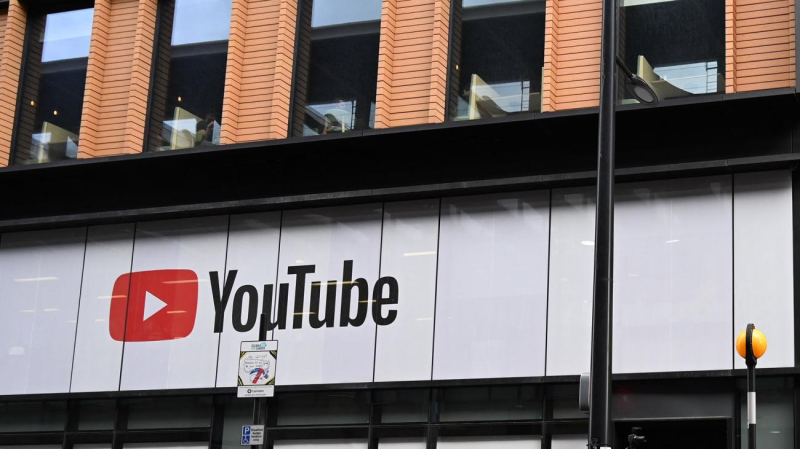
AFP The European elections are fast approaching and in their wake, the risk of censorship from GAFAM
The European elections are fast approaching and in their wake, the risk of censorship from GAFAM, under pressure from European legislative texts. YouTube, Google's video sharing subsidiary, announced on May 9 its new “features” in anticipation of the European elections. In addition to the new buttons, dedicated to its elections and their progress, which will be appearing, YouTube insists on its moderation rules, boosted by artificial intelligence (AI), to detect and remove content suspected of electoral disinformation. This “support” from YouTube comes shortly after Microsoft, another of the GAFAM, announced a fund to train in the detection of modified content.
In its press release, YouTube reveals “an overview of its efforts to help citizens in Europe and elsewhere find useful and authoritative news and electoral information”. The subsidiary of the Alphabet firm (formerly Google) has listed the new features that will soon appear on its website and its application, in anticipation of the European elections.
More than 35,000 videos deleted in the EU in 2023
YouTube mentions an information panel to direct EU viewers to “how to vote” and “how to register to vote” features, notices about candidates during user searches, or even, on D-Day, live results of the vote. “In the final weeks of the campaign, on the YouTube homepage, we will display reminders indicating where and how to vote,” it also reads.
The video-sharing platform insists above all on the rules of moderation. In its press release, “interference in the democratic process”, in all languages in both the United States and Europe, is particularly cited.“Our policies determine what is not allowed on YouTube and apply to all content, regardless of language or political viewpoint (…) For example, we remove content that misleads voters about how to vote or encourages interference in the democratic process”, it reads.
YouTube then reveals that it removed more than 35,000 videos uploaded from EU member states in 2023, for “violating [its] policies on disinformation”.
“Our global team of moderators partners with machine learning technology (Artificial Intelligence, editor’s note) to enforce these policies at scale, 24/7”.
The platform reminds that “influence campaigns” are not authorized and says it “works closely with Google’s Threat Analysis Group (TAG) to identify these types of campaigns and put an end to their chains (…) Through TAG, we also share information on threats with law enforcement, such as EUROPOL.
While waiting for the promulgation of the Artificial Intelligence Act, adopted by the European Parliament in March 2024 after an agreement with the Council in December 2023, AI, particularly generative tools such as ChatGPT, is causing great concern, particularly in the context of elections with the dissemination of misleading content, such as deepfakes.
In the meantime, Breton is making the gendarme
In this regard, YouTube now requires video creators to specify whether their content is generated by AI, even allowing itself to notify as “synthetic or modified” any content that has not been indicated as such by its creator and “likely to mislead viewers”. Censorship in sight ?
In the meantime, YouTube, like the other GAFAMs, such as Meta and its social networks Facebook and Instagram, are required by the Digital Service Act (DSA), in force since August 2023, to react to content deemed “dangerous”, “illicit” or spreading “disinformation”.
On April 30, the European Commission announced the launch of formal infringement proceedings against the platforms led by Mark Zuckerberg, for breaches of the Digital Services Regulation (DSA), a few weeks before the European elections. The European executive believes that Meta is not doing enough to combat “disinformation from Russia and other malicious regimes.”
Among the criticisms made against Meta is its non-compliance with the obligations of the regulation in terms of combating the dissemination of misleading messages, advertising and disinformation campaigns. Furthermore, the upcoming shutdown of CrowdTangle, a software widely used by journalists and researchers and considered “essential” for “spotting” and “analysing disinformation”, is not going down well with the Commission.
While Microsoft is not as significantly involved in the fight against disinformation, the firm founded by Bill Gates is taking the lead and launching a €2 million fund with OpenAI, called the “Resilience Fund,” aimed at providing training on AI-generated content during election periods through NGOs.
It’s going to be fine!
ALSO READ
Editorial control or censorship ? the director of France Inter claims her biases to “serve the general interest” On the occasion of the program “C média” presented on France 5, the director of France Inter since August 2022, Adèle Van Reeth, a philosopher by profession, returns to s… April 23, 2024 – 4:20 p.m. Politics In a speech “addressed to the French” at the Sorbonne, Macron “gesticulates” about Europe in an electoral tone Emmanuel Macron returned yesterday, Thursday April 25, to the Sorbonne to give a speech, seven years after his first address at this university. This fo… April 26, 2024 – 10:23 Politics Between editorial freedom and control of pluralism: Arcom also at the heart of debates on media independence At a time when some forty journalists' societies, twenty media outlets and unions are demanding, in a column in Le Monde, that the Minister of Culture Rachida Dati … March 28, 2024 – 12:37 Culture
You liked the article ? It mobilized our editorial staff, which lives only on your donations.
Information has a cost, especially since competition from subsidized editorial offices requires increased rigor and professionalism.
With your support, France-Soir will continue to offer its articles for free because we believe that everyone should have access to free and independent information to form their own opinion.
You are the sine qua non condition for our existence, support us so that France-Soir remains the French media that allows the most legitimate voices to be expressed.

